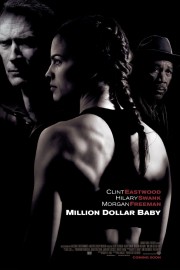Million Dollar Baby
This movie caught everyone off guard. No Fall Movie Preview mentioned it. No trailer was seen by me until December. No promotion of any kind. Of course, at this stage in his career, Clint Eastwood has earned the right to be rebellious- heck, he’s been doing it for years. The most gifted of all recent actor-directors, he’s efficient (his movies are always done on-time and budget), intelligent, and- at their best- uncompromising (though not always thoroughly compelling, as evident in “Blood Work” and “True Crime”). “Million Dollar Baby” is no different. If last year’s potent “Mystic River” was Eastwood’s best film since “Unforgiven,” “Baby” is his next “A Perfect World,” without the hype surrounding it. You know what? “Baby” is better than “World,” which was very good, but in a lot of minds, a disappointment after his 1992 Oscar winner. I’d even go so far to call it better than “River,” which is a tall order, but one “Baby” more than earns in its’ superb simplicity. After a decade of less-than-engrossing films (between “World” and “River” came “Absolute Power,” “Midnight in the Garden of Good and Evil” (probably his most notable film from that span), “True Crime,” “Space Cowboys,” and “Blood Work”), Eastwood- who also composed “Baby’s” beautifully simple score (a deserving Golden Globe nominee after the annoying minimalism of “River’s”)- is enjoying the sort of Golden Age with “River” and now “Baby” most directors at this stage of their careers only dream of, and he’s making the most of it.
“Million Dollar Baby” is the story of Frankie (Eastwood), a boxing trainer who runs a rundown gym with the help of ex-fighter Eddie (Morgan Freeman at his quietly powerful best) while his latest fighter is waiting for Frankie to let him take a shot at the title. One day, Frankie meets Maggie (Hilary Swank, who surpasses her Oscar-winner performance in “Boys Don’t Cry” with her impassioned energy here), a Southern girl working as a waitress who wants to be a boxer, and wants Frankie to train her. Frankie- as happens so often during such movies- declines. But she starts coming to the gym to workout, and keeps persisting until Frankie agrees.
If you think you know where the film is headed from that, you’d be wrong. Not completely, but in the end, you’d be wrong. You see, Eastwood- who gives a terrifically understated performance by the way (one of his best)- isn’t so much interested in the cliched underdog-goes-for-the-title story so many films have told before- though the film does go through that. Instead, he wants to explore these characters, the events and emotions that lead them to where they are in their lives now, and the events and emotion that lead them to where they end up at the end of the film, and the dillemas and passions that ultimately define who each character is. By the end, the film has taken a dramatic turn from formula that’s handled naturally and poignantly by Eastwood as what they’ve worked for, what they’ve achieved, and what they have to lose becomes clear leading up to an unforgettably haunting finale.
Eastwood understands the story he’s telling inside and out. It’s not about the championship fight. It’s not about Frankie’s returned letters to his daughter. It’s not about the fighter Frankie’s training at the start of the movie, and how he abandons Frankie for a manager who’ll get him a title fight. It’s about the choices Frankie is forced to make, whether to throw in the towel or to keep on fighting. It’s about Eddie getting that last knockout punch when a stronger boxer is beating up on a more passionate one (one of the film’s best scenes). It’s about Maggie proving herself to Frankie, to her unsupportive family, and to herself. In many ways, it’s like “Unforgiven,” and it’s about a man who- in the end- must choose between the right thing to do- which could result in an emotional purgatory- and the moral thing to do. In both films, the choice is not an easy one. At the end of the day, for Eastwood, “Million Dollar Baby” is about the choices- sometimes easy, sometimes difficult- we make everyday as to whether we stand up and fight, or know when to throw in the towel. Sometimes, as the end of this movie shows, that choice leads- in a way- to doing both. In the end, “Million Dollar Baby” is about that conflict, and the drama that results from it.










